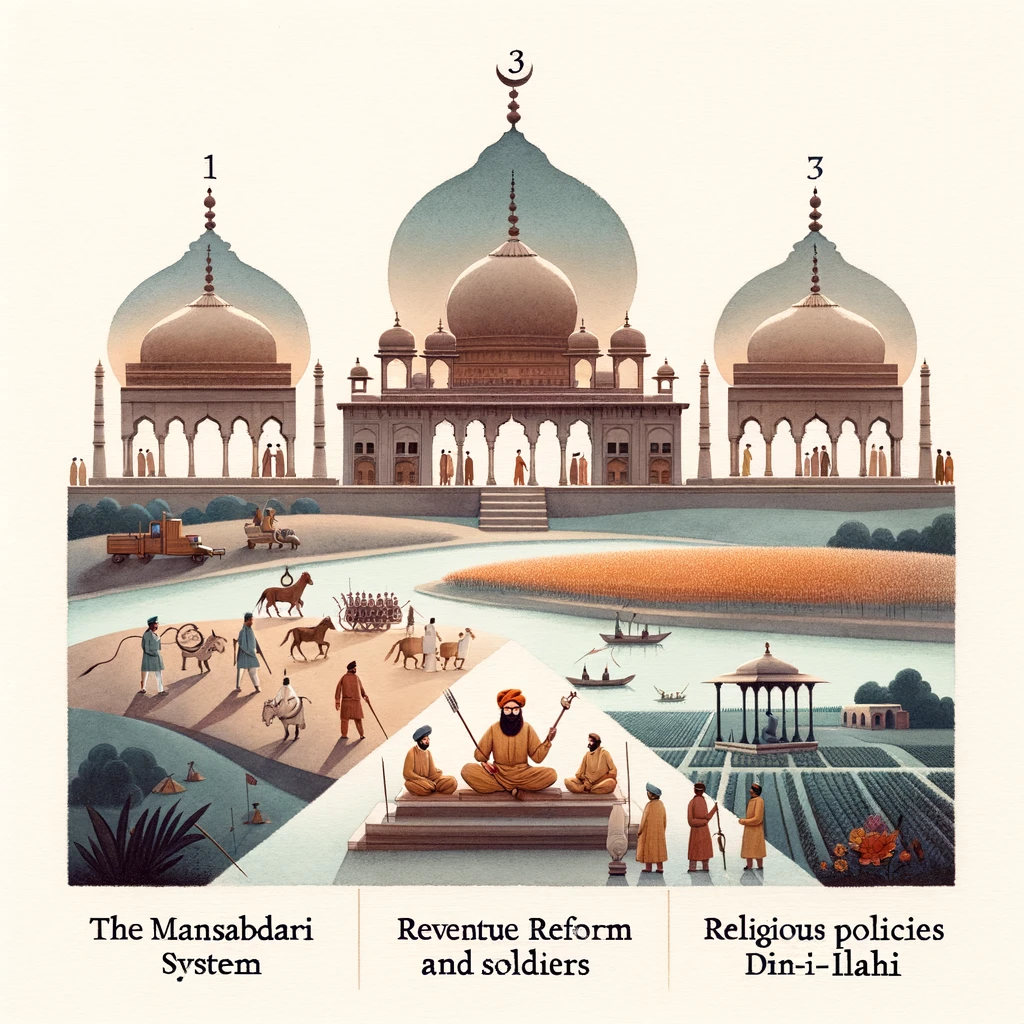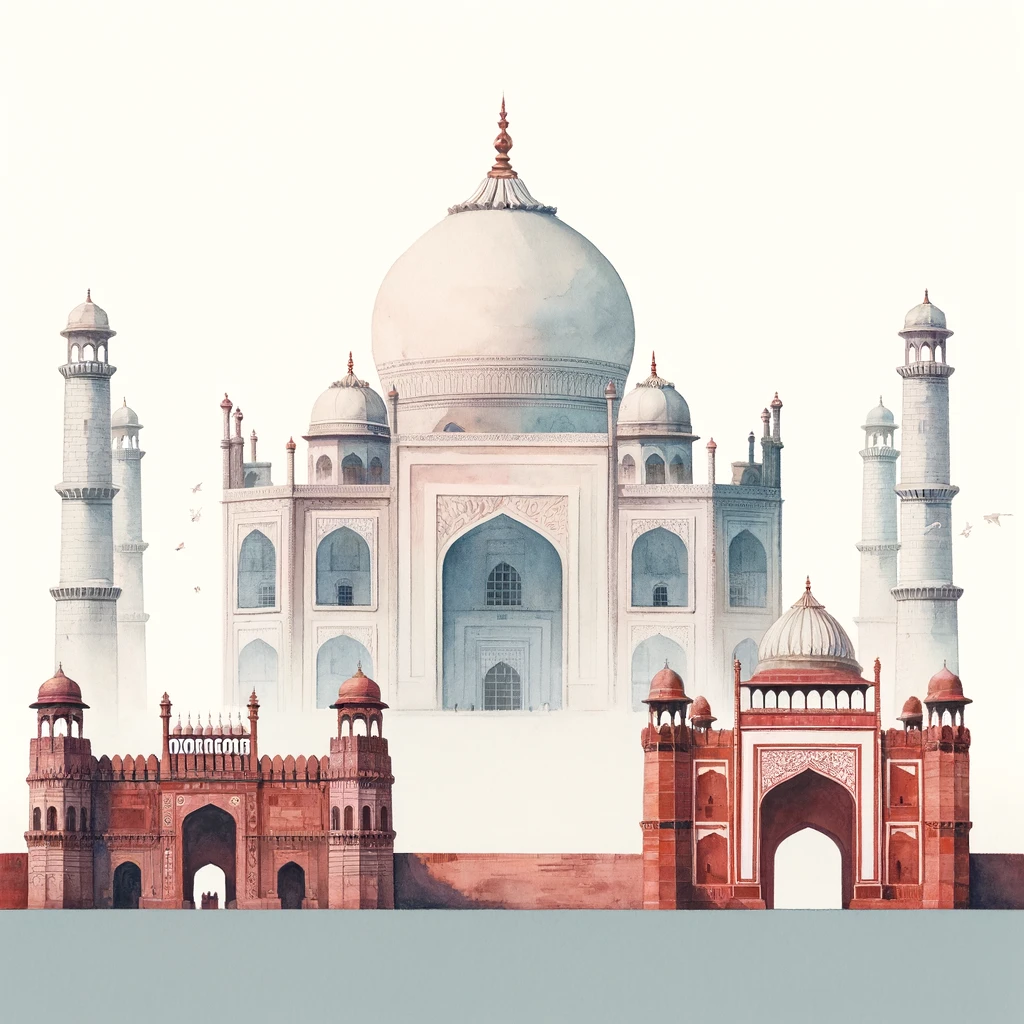Akbar, the third Mughal emperor, ruled India from 1556 to 1605 and is often regarded as one of the greatest rulers in Indian history. His administrative genius lay in his ability to create and implement policies that strengthened and stabilized the Mughal Empire, ensuring its prosperity and longevity. The administrative work of Akbar policies, including the Mansabdari system, revenue reforms, and religious policies such as Din-i-Ilahi, played a crucial role in consolidating his empire and promoting a culture of tolerance and inclusivity.

Mansabdari System
One of Akbar’s most significant administrative innovations was the Mansabdari system, a hierarchical structure of military and civil administration. This system helped streamline governance and maintain a large, effective army.
- Mansabs and Ranks: The Mansabdari system categorized officials and military commanders into different ranks, known as Mansabs. Each Mansabdar (rank holder) was assigned a numerical rank (Zat) that determined their position in the hierarchy, salary, and the number of troops they were expected to maintain (Sawar).
- Centralized Control: By centralizing the recruitment and payment of soldiers, Akbar ensured loyalty to the emperor rather than to individual commanders. This system reduced the risk of rebellions and increased the efficiency of the military.
- Merit-Based Appointments: The Mansabdari system allowed for the inclusion of both nobility and commoners, promoting meritocracy. Talented individuals from diverse backgrounds could rise to high ranks based on their abilities and contributions.
Revenue Reforms
Under the central administration of Akbar, he implemented comprehensive revenue reforms to increase state revenue and improve the economic condition of his subjects. His revenue system, known as the Dahsala system or the Todar Mal Bandobast (named after his finance minister, Raja Todar Mal), was based on a careful survey and assessment of agricultural land.
- Land Measurement and Classification: Akbar ordered a detailed survey of cultivable land, classifying it into different categories based on fertility and productivity. This classification helped in determining the tax rate for each type of land.
- Standardization of Revenue Collection: The Dahsala system standardized revenue collection by fixing tax rates based on the average production of the land over the past ten years. This system provided stability and predictability to farmers.
- Cash Payment: Akbar encouraged the payment of taxes in cash rather than in kind. This shift facilitated trade and commerce, as farmers had to sell their produce in the market to obtain cash for tax payments.
Administrative Policies of Akbar
Akbar’s religious policies were marked by tolerance, inclusivity, and efforts to foster harmony among his diverse subjects. His approach to religion was innovative and aimed at reducing sectarian conflict.
- Policy of Sulh-i-Kul (Universal Tolerance): Akbar promoted the idea of Sulh-i-Kul, which advocated for universal peace and tolerance among different religious communities. He abolished the Jizya tax on non-Muslims and welcomed people of all faiths to his court.
- Din-i-Ilahi (Divine Faith): In 1582, Akbar founded Din-i-Ilahi, a syncretic religion that combined elements of various faiths, including Islam, Hinduism, Zoroastrianism, and Christianity. Although it did not gain a large following, Din-i-Ilahi reflected Akbar’s desire to transcend religious boundaries and create a sense of unity.
- Interfaith Dialogues: Akbar encouraged interfaith dialogues and debates among scholars of different religions. He established the Ibadat Khana (House of Worship) at Fatehpur Sikri. This is where he had intellectual discussions on religion and philosophy regularly.
Conclusion
Akbar’s administrative genius was instrumental in establishing a stable and prosperous Mughal Empire. His innovative policies, including the Mansabdari system, revenue reforms, and religious tolerance, created a cohesive and efficient administration that integrated diverse regions and peoples. Akbar’s legacy as a visionary ruler and a promoter of inclusivity continues to be a significant topic of study for UPSC aspirants, highlighting the importance of effective governance and cultural integration in sustaining a large empire.


